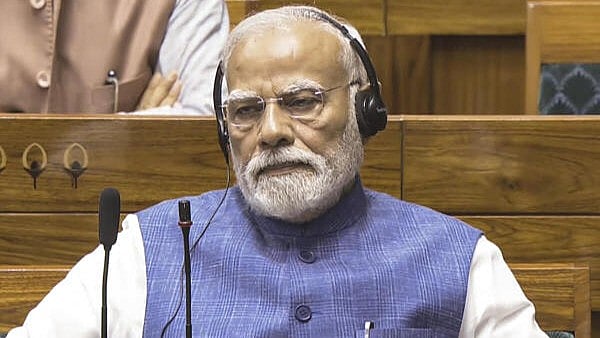
PM Narendra Modi in the Parliament during the Monsoon Session.
Credit: Sansad TV
The Constitution (130th Amendment) Bill comes with provisions for the Prime Minister, Chief Ministers, and ministers detained in custody for 30 consecutive days, for offences punishable with imprisonment for five years or more, to be removed from office by the 31st day. The powers for removing them will be held by the President, the Chief Minister (in case of state ministers), the Governor (for chief ministers), and the Lieutenant-Governor (for chief ministers of UTs).
Predictably, the Opposition parties are up in arms, because the bill, referred to a Joint Parliamentary Committee, comes at a time when the Narendra Modi-led Union government is at the receiving end on multiple issues, both domestically and internationally. Political analysts could argue that this is an attempt to shore up the government’s reputation, which has suffered repeated blows at the hands of US President Donald Trump. Meanwhile, the Opposition under Rahul Gandhi has also been hitting out against the government on ‘vote-chori’, causing the Election Commission of India (ECI) to hold an unprecedented press conference to respond to the charges of electoral mismanagement. While the EC battles it out, with its responses only triggering more questions, the National Democratic Alliance (NDA) government could suffer the real damage because the voter, inevitably, sees the government and the Commission as one.
The government’s stated motive behind the amendment is to bring “morality” back into public office. But it could be argued that the bill is aimed at diverting public attention from the allegations around the elections. The reasons notwithstanding, the bill is inherently flawed and may not be able to withstand judicial scrutiny. There is context in past observations by the Supreme Court. At least three different benches of the apex court have made scathing remarks against the Modi government’s penchant for misusing central agencies to settle political scores. A bench observed recently, while dealing with a petition filed by MP Karti Chidambaram, that the Enforcement Directorate “cannot act like a crook.” Chief Justice Gawai noted that the ED was “crossing all limits” while stating that “we know what you are doing”, and advised the government to “settle political battles politically.”
Legal principles undermined
Several leaders in the Opposition fold have made a beeline for the BJP after facing charges at the hands of agencies under the control of the government. Even if the claims regarding the misuse of agencies are contestable, the question is, does the law permit a person who has not been convicted after due process to suffer the consequences of his pre-trial arrest? Blackstone’s ratio of the 18th century – let a hundred persons go scot-free, let not one innocent suffer – is directly hit by the proposed amendment. Thus, the legal principle of ‘innocent until proven guilty’ would take a serious knock. From this standpoint, well-entrenched legal principles that have withstood the challenges of time are being turned on their head.
The idea of a Police State with untrammelled powers stands in conflict with a parliamentary democracy. Furthermore, with retired and even sitting judges of the Supreme Court commenting on a section of the judges being pliant or corrupt, or both, the bill could play havoc on the political system.
Previous legislations have stipulated that offending members lose their membership in the Legislature. But those members were held guilty after due process was followed. The present bill, however, takes out the idea of trial and conviction. It may be possible for even a proven offender to argue that he or she has already faced punishment by loss of office and, therefore, the rule of double jeopardy ought to apply. This will cast a cloud over the punishment levied by courts. This is, of course, a hypothesis, but repeatedly supported hypotheses can often contribute to the formulation of laws.
There is another contention on the motives behind the amendment. Given the manner in which the numbers in Parliament are stacked, passage for the amendment is almost impossible because it will require two-thirds support. Considering that the ruling coalition is well short of the required numbers, the possibility of a diversionary agenda has also gained credence. By setting the stage for an intense political debate around the new bill, the BJP may even be eyeing returns for its alliance with the JD(U) in the upcoming Assembly election in Bihar. For the party, this is also an opening to play the card of morality, which this dispensation is losing anyway.
(The writer, a former legal advisor to the Government of Karnataka, is an advocate at the Supreme Court of India)
Disclaimer: The views expressed above are the author's own. They do not necessarily reflect the views of DH.